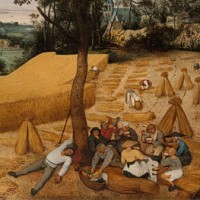4 Poets in the Bellevue Literary Review

The Bellevue Literary Review publishes fiction, nonfiction and poetry about the human body, illness, health and healing. It is based on the Bellevue Hospital, the oldest public hospital in the United States, and published twice a by the Department of Medicine at NYU Langone Medical Center. Many well-known literary figures have featured in its pages, and a $1,000 prize in awarded annually in each genre.
Happy Hour by Chard deNiord is a typical piece, and can be read at: http://blr.med.nyu.edu/content/archive/2013/spring/happyhour
Chard deNiord is a former a psychiatric aide and psychotherapist. He now the author of four books of poetry, and professor of English at Providence College. Happy Hour is a narrative, perhaps a rather undemanding one, that starts:
I stood behind the table of urinals on evening shift, my last day on the job, and turned this ward into a bar.
And concludes by noting our common humanity:
I drank as Alex did, in a single swig, then put my goblet down on the bar and smelled that smell that was also mine.
Many contributions are in this vein: quiet observations on the human condition at its most vulnerable, in lines that are probably best called prose. Lithium and the Absence of Desire by Virginia Chase Sutton attempts a little more: the ‘winter’s amnesia’ brought on by taking the antidepressant lithium. The author went on to publish in leading journals and be a finalist for National Poetry Series, the Walt Whitman Award, The Levis Poetry Prize and other competitions. The poem can be read here: http://blr.med.nyu.edu/content/archive/2005/spring/lithium
You have no idea what you are giving away. Winter’s amnesia is coming. At first it seems impossible because you live so fully in mossy, rainy lakes. You have watched pelicans sail over a mirrored surface just above and just below the water.
But the side-effects are serious:
You are not prepared for the gray clouds stealing close, shriveling the shoreline to a smudge, sucking at the waves. Desire falters after the first mouthful, a little swallow.
The medication’s flash freezes you to winter.
How you will shiver, forced to settle for icy ruin, numb winters of regret.
Readers need a strong stomach for this sort of work, as they’re not spared the details. Someone Else’s Pain by Brenna Working Lemieux gives us lines like:
You, who exult in fatigue, whom sweat salves, whom motion girds like prayer, try to tell me calmly that your new meniscus (transplanted last summer, not yet healed) has torn, or turned, or that scar tissue has crept between your ligaments
Brenna Working Lemieux earned her MFA from Southern Illinois University, and has lived in Chicago, Baltimore, Paris, and Galway. The poem can be read at: http://blr.med.nyu.edu/content/editors-picks/pain
The final poem is this brief survey is no more comforting: Bottom Drawer by Amanda Auchter. She is the founding editor of Pebble Lake Review and teaches creative writing and composition at Lone Star College-CyFair. The poem can be read at: http://blr.med.nyu.edu/content/archive/2010/bottomdrawer
The poem starts quietly enough:
Tucked beneath my mother’s shirts and camisoles, a paper bag of prayer cards, I find my brother’s pajamas.
But concerns coming to terms with loss:
I want to take them out, understand how she can spend an afternoon in an empty house with them.
Perhaps she doesn’t:
I wonder if she wears them, or how often, if at night she slips into bed with the shirt, cradles him back into her.
The narrator spread the pajamas out:
Each arm uncrossed and flattened, the flannel pants draped over the bed as though someone meant to wear them, but chose something else instead.
Uncompromising poems that don’t make easy reading, which is perhaps why we should make the effort.
